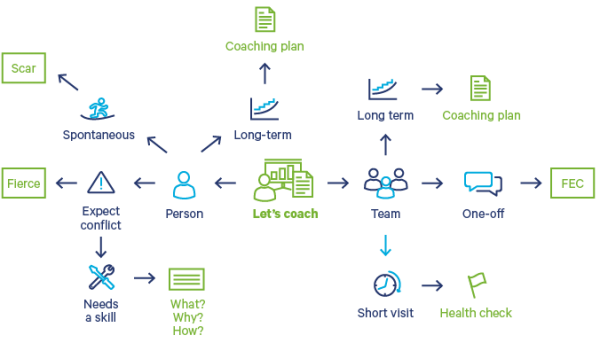Would you prefer coaching or coaching?
I ran an agile coaching course recently and, naturally, we spoke a lot about coaching.
We ran through a lot of different techniques and approaches to coaching people in agile teams, but we discovered that both “coaching” and “agile” might mean different things to different people in different teams.
Then someone asked how they would know when to apply different approaches to coaching. The answer we came up with was:
“It depends who you are coaching and what they are hoping to achieve.”
That left people a little confused about how and when to apply different techniques. So we came up with the following diagram that might help (although I have added a couple of bits based on previous conversations with people).

Basically, before you can decide on the best approach to take to coaching, you need to ask:
- Who am I proposing to coach?
- What are they trying to achieve?
- What is constraining them from achieving their goal, or what would enable to better achieve it?
- How might coaching help them?
When you ask who you are coaching, you will probably realise that your approach to coaching will differ, depending on whether you are coaching an individual or a team. This does not mean that your entire coaching assignment must focus on only one of these – of course, you will find you are coaching different people in different things during the engagement.
But for each interaction, or opportunity to add value as a coach, you will either be coaching a person or a group. As a result, you will need a toolkit, with tools to address different coaching tasks, just as a carpenter has a toolkit to use when practicing their craft.
Let’s look at what a basic toolkit might look like:
- Before you coach someone in “agile,” you need to work out what “agile” is. So if you claim to be an agile coach you should ask “what does agile mean to people in this environment. Similarly, you were a “performance coach” you would need to know what “performance” means in a particular assignment.
- You also need a starting point for each coaching opportunity. I believe that every coach should ask the following questions before they plan any coaching:
- Who am I coaching this time?
- What do they do? Or what are they trying to achieve?
- What constraints are holding them back, or what would better enable them?
- How might coaching help with this? From this, you can come up with a coaching goal.
- How can coaching help them? From this you can come up with a coaching approach.
This set of questions will set you up to begin coaching and in fact, I don’t think you can really coach someone if you don’t ask these questions first.
Next, you will need a set of tools to use in different situations. For example, you might come up with the following:
- Approaches for working with a single person
- An approach for when someone comes up and spontaneously asks for help
- An approach for when a tackling a difficult issue
- An approach to teaching a new skill
- An approach to formally coaching someone over an extended period
2. Approaches for working with a team or group
- An approach to assessing a team’s needs and current “health”
- An approach to running a workshop or working with a team on a single goal or issue
- An approach to lifting the capability of a team over an extended period of time
You might have multiple tools for each of these situations or you might have just one good tool. But you should be aware of the tools you have in your toolkit and the circumstances in which you would use them.
You should also become good at the beginning of the coaching opportunity – identifying who you are coaching and what they are working toward so that you will be able to select the right tools and apply them well.
Posted by James King
Copyright © James King
Thank you!
Your details have been submitted and we will be in touch.
Thank you!
Your details have been submitted and we will be in touch.